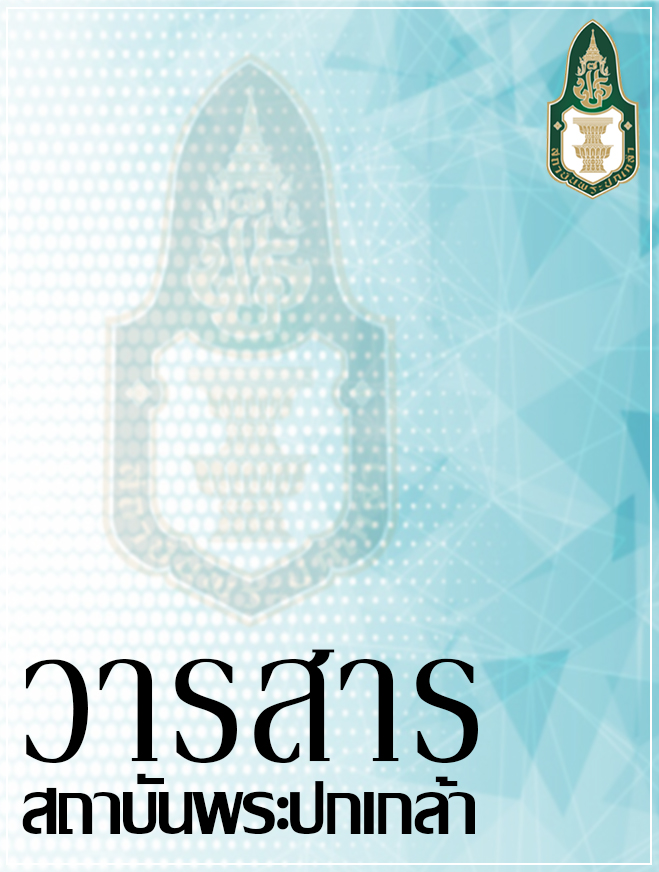การเลือกตั้งผู้แทนจากกลุ่มอาชีพจะแก้ปัญหาประชาธิปไตยแบบมีตัวแทนได้หรือไม่ : บทวิจารณ์ความเป็นไปได้ของข้อเสนอการเมืองใหม่
Main Article Content
Abstract
นับตั้งแต่ปฐมบทการพยายามสร้างประชาธิปไตยในประเทศไทย หลังการปฏิวัติสยาม พ.ศ.2475 เป็นต้นมาจนถึงปัจจุบัน “การปกครองโดยรัฐสภา” ได้รับการยอมรับว่าเป็นหลักการสาคัญของการปกครองประเทศ กล่าวคือ การเลือกตั้งผู้แทนบนพื้นฐานของการแบ่งเขตพื้นที่ภูมิศาสตร์ (geographical constituencies) เป็นวิธีการหลักที่ใช้มาตลอดจนบางครั้งการได้รับการเลือกตั้งกลายเป็นข้ออ้างความชอบธรรมของผู้แทนในการใช้อานาจทางการเมือง และการได้เป็นผู้แทนที่มาจากการเลือกตั้งเป็นข้อที่ใช้อ้างโดยรัฐบาลและผู้สนับสนุนในสภาผู้แทนราษฏรว่ามีความชอบธรรมสูงกว่าวุฒิสมาชิกที่มาจากการแต่งตั้ง หรือจากการสรรหา รวมไปถึงการกระทาที่ก้าวล่วงไปท้าทายอานาจศาลว่า ผู้พิพากษาไม่กี่คนที่มาจากการแต่งตั้งไม่น่าจะมีสิทธิในการตัดสินวินิจฉัยความผิดของนักการเมืองที่มาจากการเลือกตั้ง การปกครองในระบอบประชาธิปไตยแบบมีตัวแทนที่ใช้อยู่ในประเทศไทยจึงเป็นการปกครองที่เน้นความเป็นประชาธิปไตยแบบวิธี สบัญญัติ (procedural) มากกว่าเน้นเนื้อหา หลักการ และปรัชญาของอุดมการณ์ประชาธิปไตย เกิดสภาพการต่อสู้ทางการเมืองที่เน้นการเลือกตั้งว่าเป็นวิธีการได้มาซึ่งความชอบธรรมในการปกครองเพียงวิธีเดียว ซึ่งมิใช่เป็นปรากฏการณ์ที่เกิดเฉพาะในประเทศไทยเท่านั้น เพราะแม้แต่ประเทศที่มีการปกครองแบบอานาจนิยมหรือเผด็จการ ผู้นาของประเทศก็มักจะอ้างความชอบธรรมว่ามาจากการเลือกตั้ง เกิดเป็นความเชื่อที่นักวิชาการเรียกว่า electoralism ซึ่งเป็นความเข้าใจที่ไม่ถูกต้องนัก นักเขียนเรื่องประชาธิปไตยถือว่า electoralism เป็น fallacy อย่างหนึ่งแม้กระทั่งในบรรดาผู้ที่เชื่อว่า แท้จริงแล้วประชาธิปไตยเป็นเพียงวิธีการ (method) อย่างหนึ่งในการได้มาซึ่งอานาจอันชอบธรรมของผู้แสวงหาอานาจจากการลงสมัครรับเลือกตั้ง
Article Details
@ 2020 King Prajadhipok's Institute The Government Complex Commemorating All Right Reserved.
References
รัฐธรรมนูญแห่งราชอาณาจักรไทย พุทธศักราช 2550.
Birch, A.H. (1964). Representative and Responsible Government : An Essay on the British Constitution (Toronto, University of Toronto Press.) โดยเฉพาะ Chapter 18 “Theories of Group Representation.” pp.105-113.
Bohman, James and Williams Rehg (eds). (1997). Deliberative Democracy : Essays on Reason and Politics. Cambridge ; Massachusetts, the MIT Press.
Davies, Peter and Dereck Lynch. (2002). The Routledge Companion to Fascism and the Far Right. London : Rout ledge.
Dryzek, John S. (1990). Discursive Democracy : Politics, Policy, and Political Science. Cambridge : Cambridge University Press.
Dryzek, John S. (2002). Deliberative Democracy and Beyond : Liberals, Critics, Contestations. Oxford : Oxford University Press.
Faulks, Keith. (2002). Political Sociology : A Critical Introduction. New York : New York University Press. pp.143-162.
Greenwood, Justin (2007), Interest Representation in the European Union, second edition. New York : Palgrave Macmillan.
Greger, A. James. (1979). Italian Fascism and Developmental Dictatorship. New Jersey : Princeton University Press.
Hirst, Paul. (1990). Representative Democracy and Its Limits. Cambridge : U.K. Polity Press. ดู Corporatism, หน้า 96, 118, 143-4, 146, 148, 270.
Hirst, Paul. (1994). Associative Democracy : New Forms of Economic and Social Governance. Cambridge, U.K. : Polity Press.
Huntington, Samuel P. (1991). The Third Wave : Democratization in the Late Twentieth Century. Norman : University of Oklahoma Press.
Goodin, Robert E, Reflective Democracy 2003. Oxford : Oxford University Press.
Macedo, Stephen (ed). 1999. Deliberative Politics : Essays on Democracy and Disagreement. New York : Oxford University Press.
Nolte, Ernst. (1963, 1965). Three Faces of Fascism : Action Francaise, Italian Fascism, National Socialism. New York : Mentor Book.
Pitkin, Hanna Fenichel. (1967). The Concept of Representation. Berkley : University of California Press. Chapter 4 “Standing For Descriptive Representation “, pp. 60-91.
Pennock, J. Roland. (1979). Democratic Political Theory. Princeton, New Jersey : Princeton University Press.
Fischer, Frank (2006). “Participatory Governance as Deliberative Empowerment,” American Review of Public Administration Vol.36, No.1, (arch 2000), 19-40.
Martin, Brian. (2001). “Democracy Without Election,” Social Anarchism, No.21, 1995-96. pp 18-51.
Linsey, Josan Royce. Functional Representation and Its Anarchist Origins (N.D.). Unpublished paper.
Tupone, Ferdinando, (2008). “From Neo-Corporatism to Neo-Neo Corporatism : Rethinking the Corporatist Approach” Discussion Paper. University of Bologna, Forli, (June 5-7, 2008).
Hongkong 2006 – Constitution and Administration/ http://www.yearbook.gov.hk/2006/en/01)06htm.3 pages.
Ludwig von Mises Institute (Alabama), “xxx111. Syndicalism and Corporatism” http://mises.org/humanaction/chap33sec4.asp 4 pages


